Taxation Law: Impact of Sharing Economy on Tax Revenue in Australia
VerifiedAdded on 2022/11/22
|13
|3245
|294
Report
AI Summary
This report examines the impact of the sharing economy on Australian taxation law, focusing on the challenges it poses to traditional business models and tax compliance. It contrasts the digital transportation business model (Uber) with the traditional taxi system, highlighting key differences that affect taxation outcomes. The report addresses concerns that the sharing economy may lead to reduced tax revenues due to difficulties in identifying taxpayers and assessing income. It also discusses the Black Economy Taskforce Final Report and the broader implications of the black economy on tax revenues, welfare costs, and societal fairness. The analysis includes a discussion of the tax consequences under existing Australian tax law, emphasizing the need for greater transparency and compliance within the sharing economy to ensure fair competition and adequate tax collection. Desklib provides access to this and many other solved assignments to assist students in their studies.
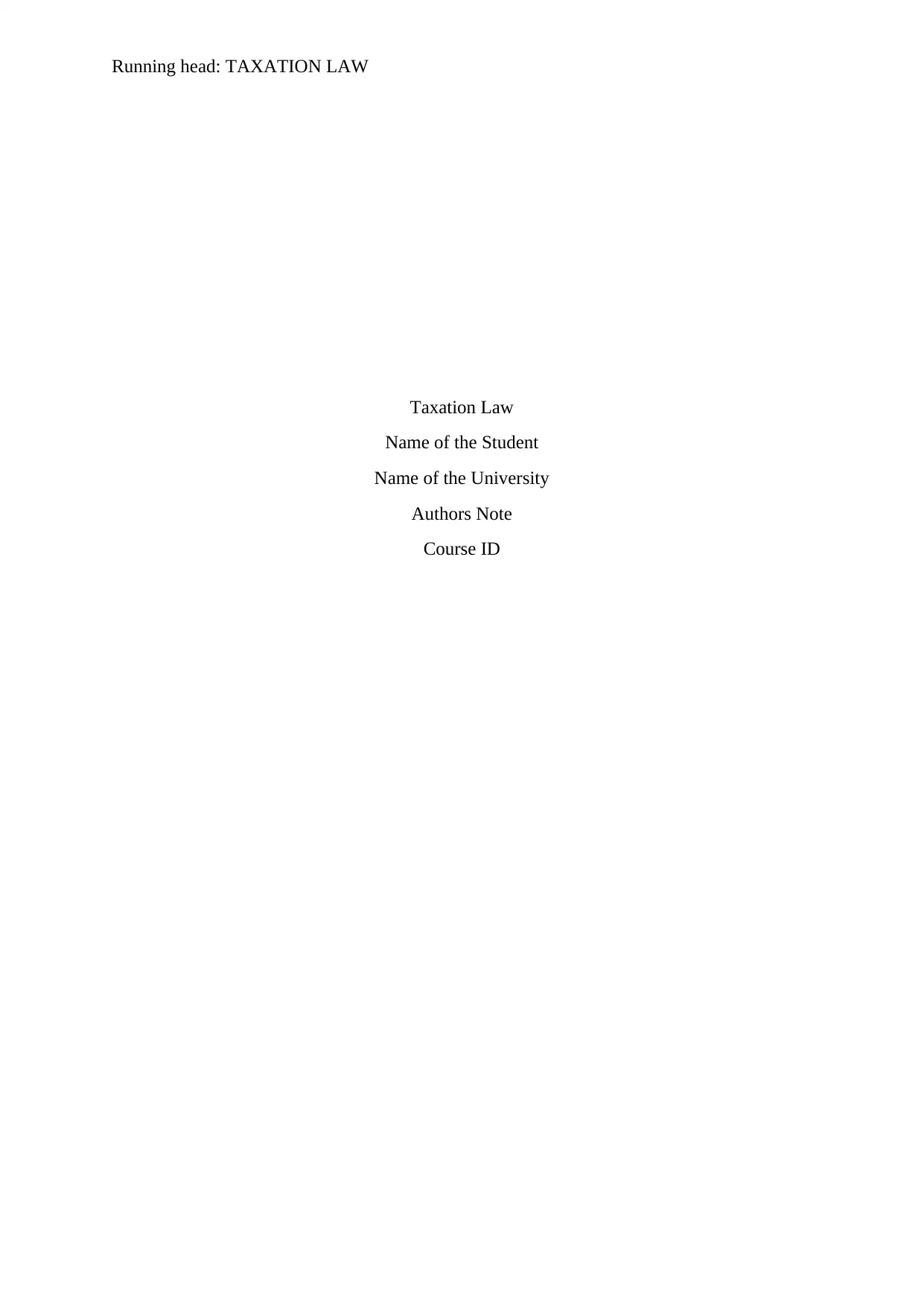
Running head: TAXATION LAW
Taxation Law
Name of the Student
Name of the University
Authors Note
Course ID
Taxation Law
Name of the Student
Name of the University
Authors Note
Course ID
Paraphrase This Document
Need a fresh take? Get an instant paraphrase of this document with our AI Paraphraser
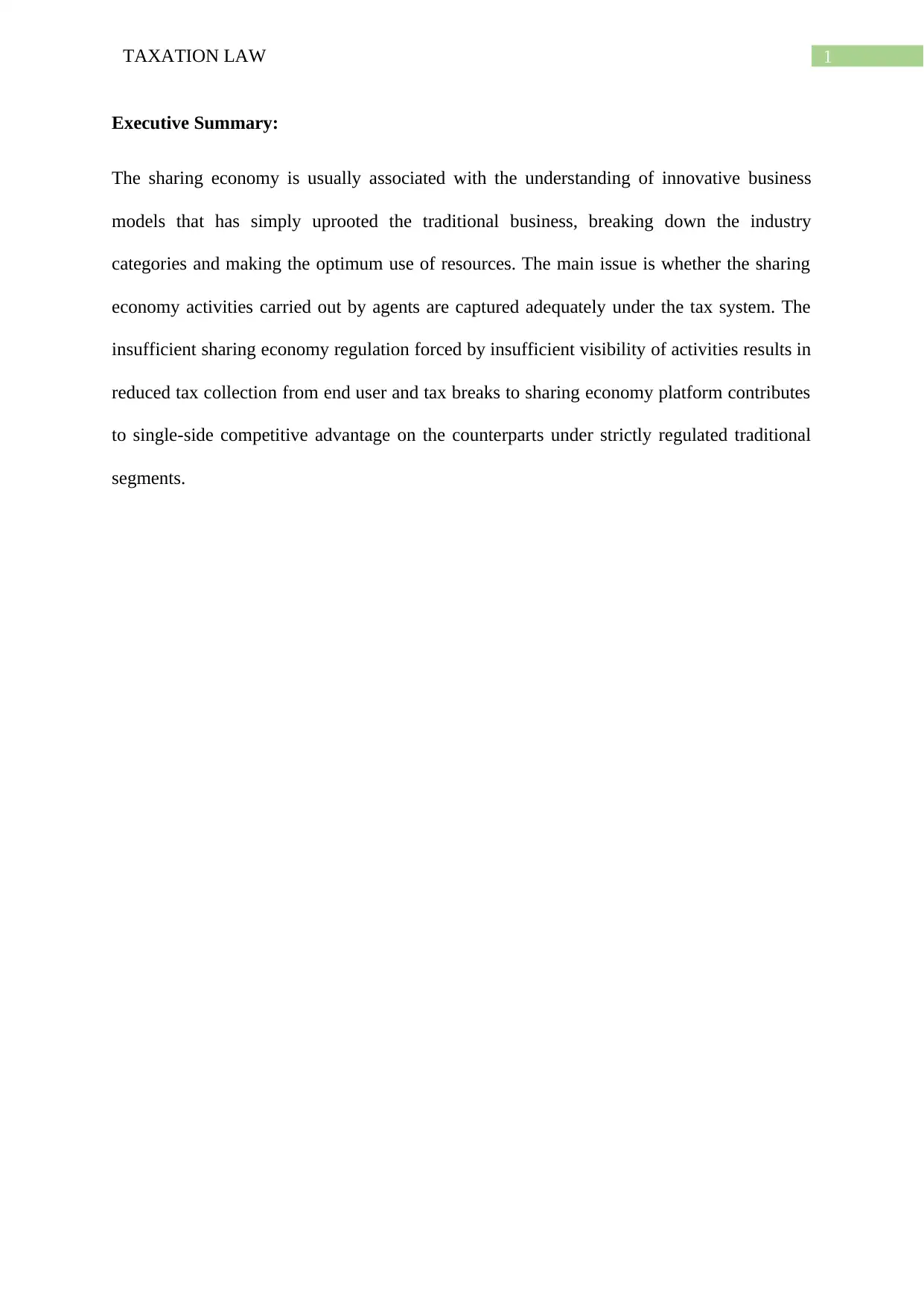
1TAXATION LAW
Executive Summary:
The sharing economy is usually associated with the understanding of innovative business
models that has simply uprooted the traditional business, breaking down the industry
categories and making the optimum use of resources. The main issue is whether the sharing
economy activities carried out by agents are captured adequately under the tax system. The
insufficient sharing economy regulation forced by insufficient visibility of activities results in
reduced tax collection from end user and tax breaks to sharing economy platform contributes
to single-side competitive advantage on the counterparts under strictly regulated traditional
segments.
Executive Summary:
The sharing economy is usually associated with the understanding of innovative business
models that has simply uprooted the traditional business, breaking down the industry
categories and making the optimum use of resources. The main issue is whether the sharing
economy activities carried out by agents are captured adequately under the tax system. The
insufficient sharing economy regulation forced by insufficient visibility of activities results in
reduced tax collection from end user and tax breaks to sharing economy platform contributes
to single-side competitive advantage on the counterparts under strictly regulated traditional
segments.
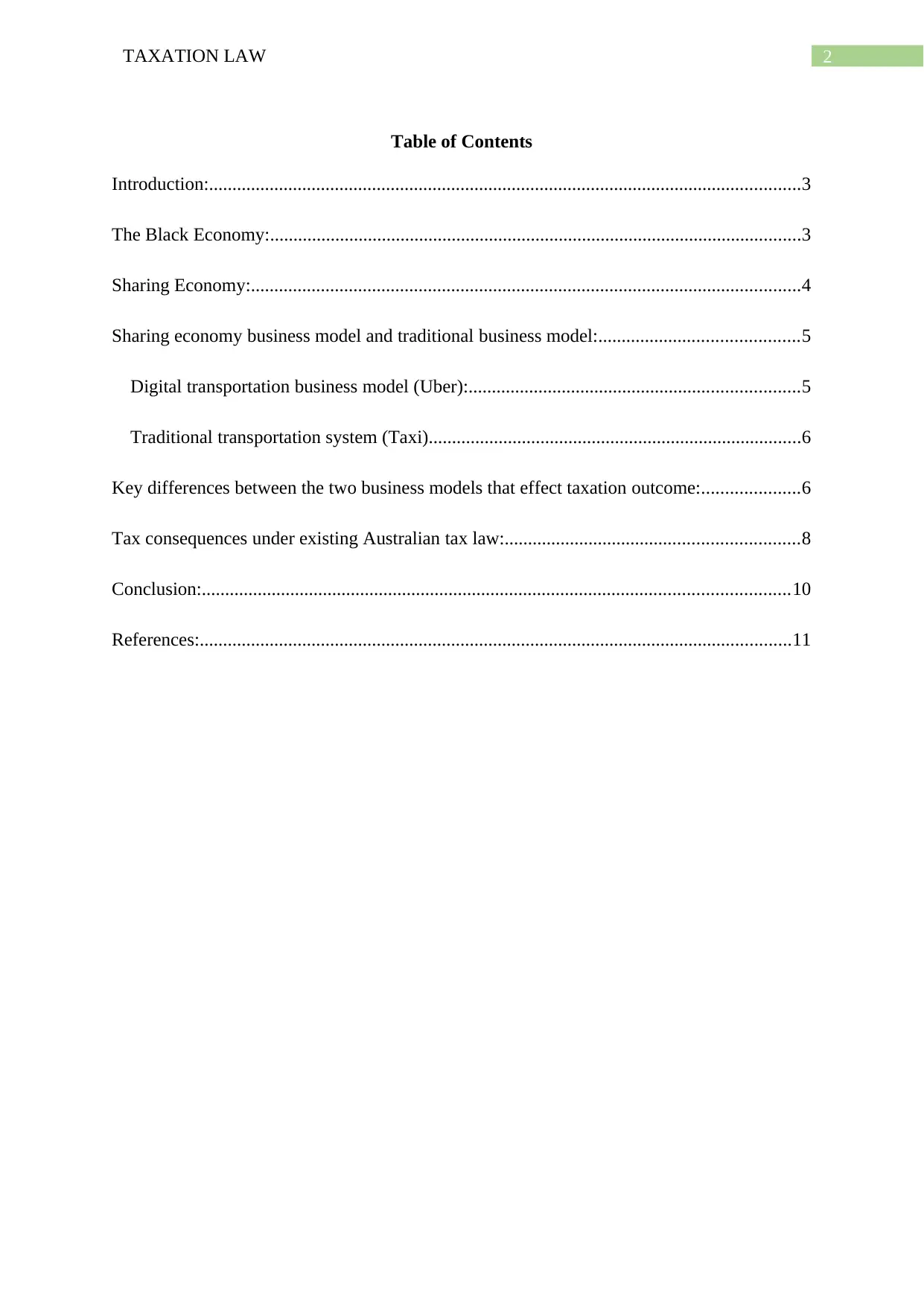
2TAXATION LAW
Table of Contents
Introduction:...............................................................................................................................3
The Black Economy:..................................................................................................................3
Sharing Economy:......................................................................................................................4
Sharing economy business model and traditional business model:...........................................5
Digital transportation business model (Uber):.......................................................................5
Traditional transportation system (Taxi)................................................................................6
Key differences between the two business models that effect taxation outcome:.....................6
Tax consequences under existing Australian tax law:...............................................................8
Conclusion:..............................................................................................................................10
References:...............................................................................................................................11
Table of Contents
Introduction:...............................................................................................................................3
The Black Economy:..................................................................................................................3
Sharing Economy:......................................................................................................................4
Sharing economy business model and traditional business model:...........................................5
Digital transportation business model (Uber):.......................................................................5
Traditional transportation system (Taxi)................................................................................6
Key differences between the two business models that effect taxation outcome:.....................6
Tax consequences under existing Australian tax law:...............................................................8
Conclusion:..............................................................................................................................10
References:...............................................................................................................................11
⊘ This is a preview!⊘
Do you want full access?
Subscribe today to unlock all pages.

Trusted by 1+ million students worldwide
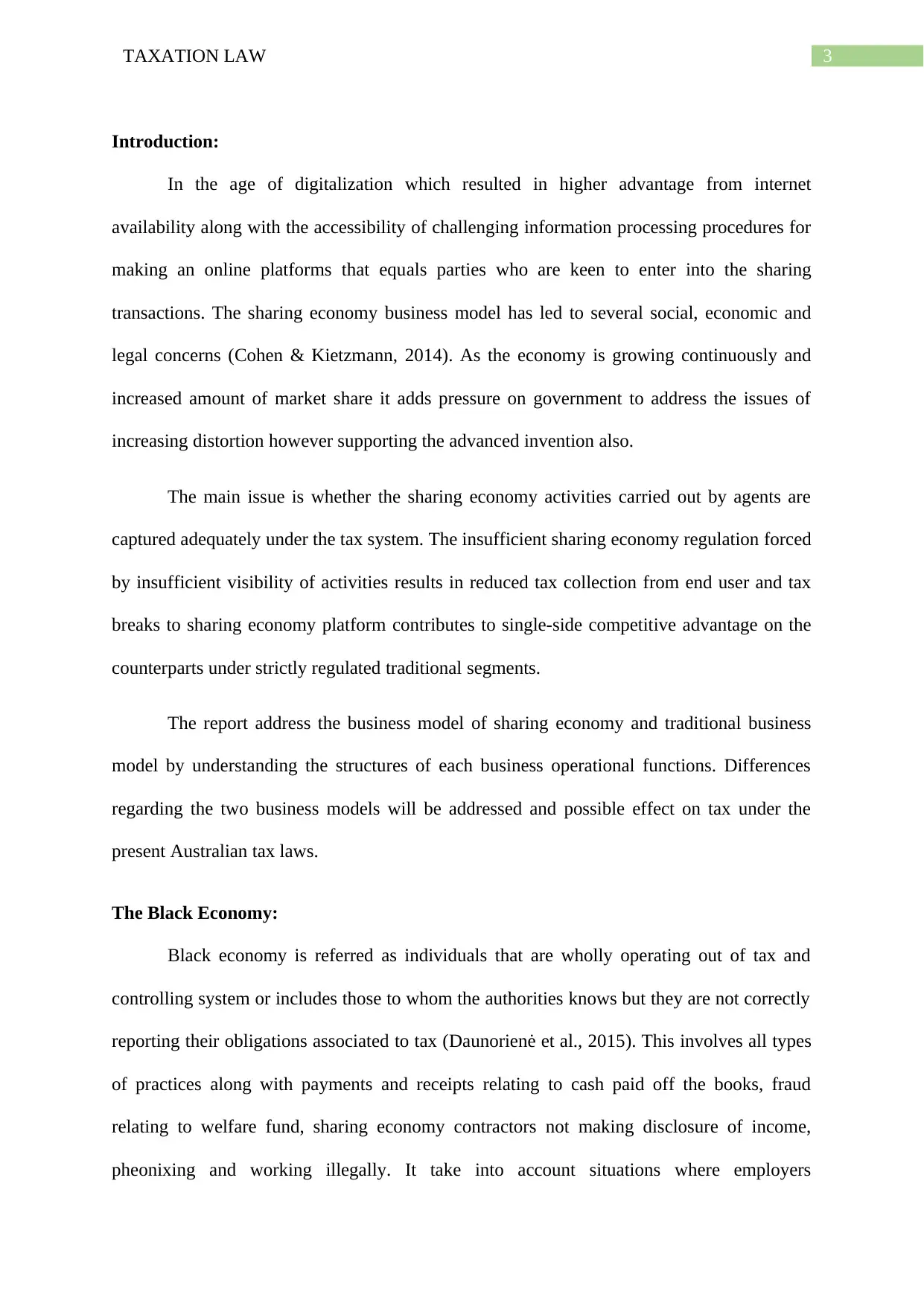
3TAXATION LAW
Introduction:
In the age of digitalization which resulted in higher advantage from internet
availability along with the accessibility of challenging information processing procedures for
making an online platforms that equals parties who are keen to enter into the sharing
transactions. The sharing economy business model has led to several social, economic and
legal concerns (Cohen & Kietzmann, 2014). As the economy is growing continuously and
increased amount of market share it adds pressure on government to address the issues of
increasing distortion however supporting the advanced invention also.
The main issue is whether the sharing economy activities carried out by agents are
captured adequately under the tax system. The insufficient sharing economy regulation forced
by insufficient visibility of activities results in reduced tax collection from end user and tax
breaks to sharing economy platform contributes to single-side competitive advantage on the
counterparts under strictly regulated traditional segments.
The report address the business model of sharing economy and traditional business
model by understanding the structures of each business operational functions. Differences
regarding the two business models will be addressed and possible effect on tax under the
present Australian tax laws.
The Black Economy:
Black economy is referred as individuals that are wholly operating out of tax and
controlling system or includes those to whom the authorities knows but they are not correctly
reporting their obligations associated to tax (Daunorienė et al., 2015). This involves all types
of practices along with payments and receipts relating to cash paid off the books, fraud
relating to welfare fund, sharing economy contractors not making disclosure of income,
pheonixing and working illegally. It take into account situations where employers
Introduction:
In the age of digitalization which resulted in higher advantage from internet
availability along with the accessibility of challenging information processing procedures for
making an online platforms that equals parties who are keen to enter into the sharing
transactions. The sharing economy business model has led to several social, economic and
legal concerns (Cohen & Kietzmann, 2014). As the economy is growing continuously and
increased amount of market share it adds pressure on government to address the issues of
increasing distortion however supporting the advanced invention also.
The main issue is whether the sharing economy activities carried out by agents are
captured adequately under the tax system. The insufficient sharing economy regulation forced
by insufficient visibility of activities results in reduced tax collection from end user and tax
breaks to sharing economy platform contributes to single-side competitive advantage on the
counterparts under strictly regulated traditional segments.
The report address the business model of sharing economy and traditional business
model by understanding the structures of each business operational functions. Differences
regarding the two business models will be addressed and possible effect on tax under the
present Australian tax laws.
The Black Economy:
Black economy is referred as individuals that are wholly operating out of tax and
controlling system or includes those to whom the authorities knows but they are not correctly
reporting their obligations associated to tax (Daunorienė et al., 2015). This involves all types
of practices along with payments and receipts relating to cash paid off the books, fraud
relating to welfare fund, sharing economy contractors not making disclosure of income,
pheonixing and working illegally. It take into account situations where employers
Paraphrase This Document
Need a fresh take? Get an instant paraphrase of this document with our AI Paraphraser
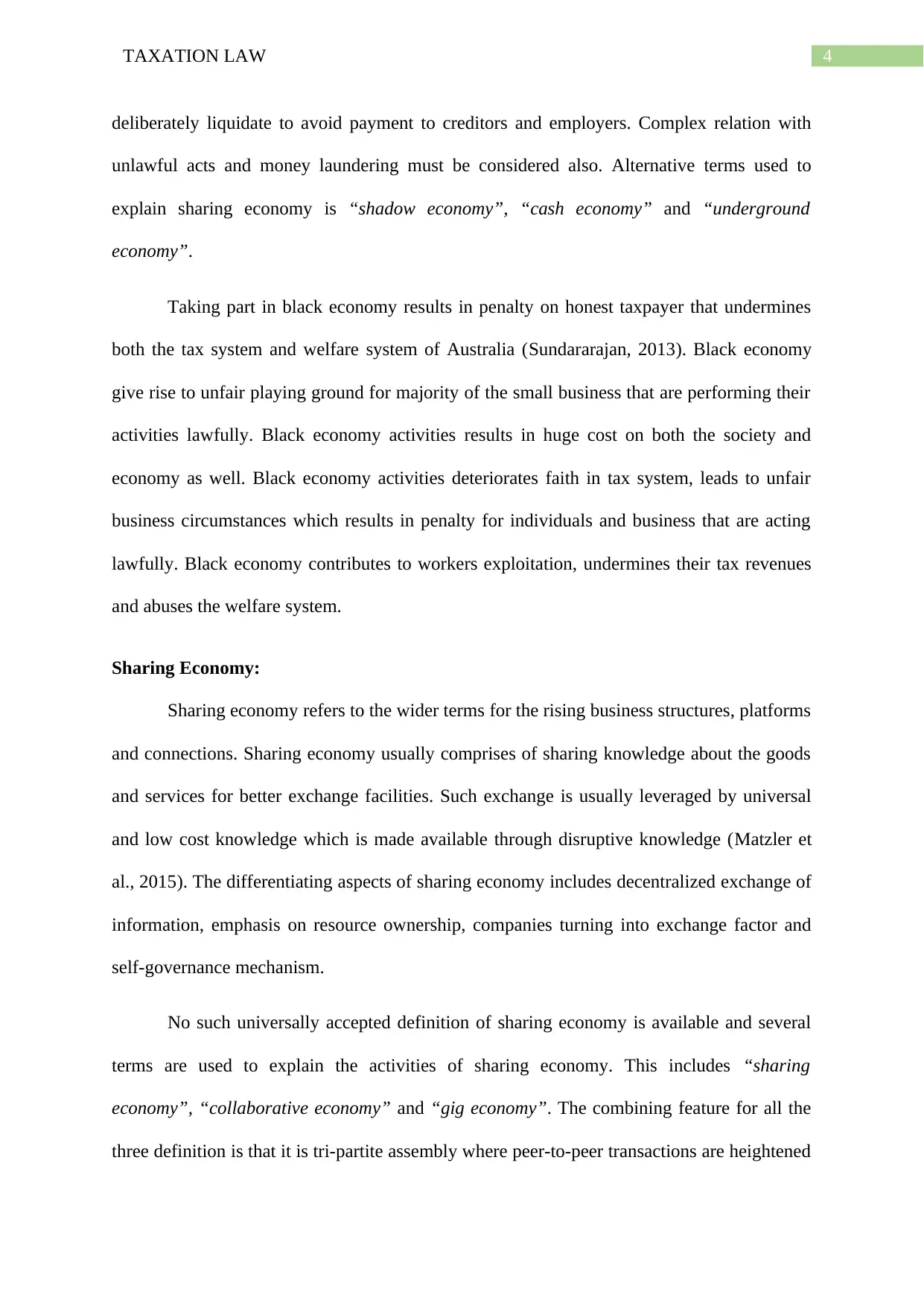
4TAXATION LAW
deliberately liquidate to avoid payment to creditors and employers. Complex relation with
unlawful acts and money laundering must be considered also. Alternative terms used to
explain sharing economy is “shadow economy”, “cash economy” and “underground
economy”.
Taking part in black economy results in penalty on honest taxpayer that undermines
both the tax system and welfare system of Australia (Sundararajan, 2013). Black economy
give rise to unfair playing ground for majority of the small business that are performing their
activities lawfully. Black economy activities results in huge cost on both the society and
economy as well. Black economy activities deteriorates faith in tax system, leads to unfair
business circumstances which results in penalty for individuals and business that are acting
lawfully. Black economy contributes to workers exploitation, undermines their tax revenues
and abuses the welfare system.
Sharing Economy:
Sharing economy refers to the wider terms for the rising business structures, platforms
and connections. Sharing economy usually comprises of sharing knowledge about the goods
and services for better exchange facilities. Such exchange is usually leveraged by universal
and low cost knowledge which is made available through disruptive knowledge (Matzler et
al., 2015). The differentiating aspects of sharing economy includes decentralized exchange of
information, emphasis on resource ownership, companies turning into exchange factor and
self-governance mechanism.
No such universally accepted definition of sharing economy is available and several
terms are used to explain the activities of sharing economy. This includes “sharing
economy”, “collaborative economy” and “gig economy”. The combining feature for all the
three definition is that it is tri-partite assembly where peer-to-peer transactions are heightened
deliberately liquidate to avoid payment to creditors and employers. Complex relation with
unlawful acts and money laundering must be considered also. Alternative terms used to
explain sharing economy is “shadow economy”, “cash economy” and “underground
economy”.
Taking part in black economy results in penalty on honest taxpayer that undermines
both the tax system and welfare system of Australia (Sundararajan, 2013). Black economy
give rise to unfair playing ground for majority of the small business that are performing their
activities lawfully. Black economy activities results in huge cost on both the society and
economy as well. Black economy activities deteriorates faith in tax system, leads to unfair
business circumstances which results in penalty for individuals and business that are acting
lawfully. Black economy contributes to workers exploitation, undermines their tax revenues
and abuses the welfare system.
Sharing Economy:
Sharing economy refers to the wider terms for the rising business structures, platforms
and connections. Sharing economy usually comprises of sharing knowledge about the goods
and services for better exchange facilities. Such exchange is usually leveraged by universal
and low cost knowledge which is made available through disruptive knowledge (Matzler et
al., 2015). The differentiating aspects of sharing economy includes decentralized exchange of
information, emphasis on resource ownership, companies turning into exchange factor and
self-governance mechanism.
No such universally accepted definition of sharing economy is available and several
terms are used to explain the activities of sharing economy. This includes “sharing
economy”, “collaborative economy” and “gig economy”. The combining feature for all the
three definition is that it is tri-partite assembly where peer-to-peer transactions are heightened
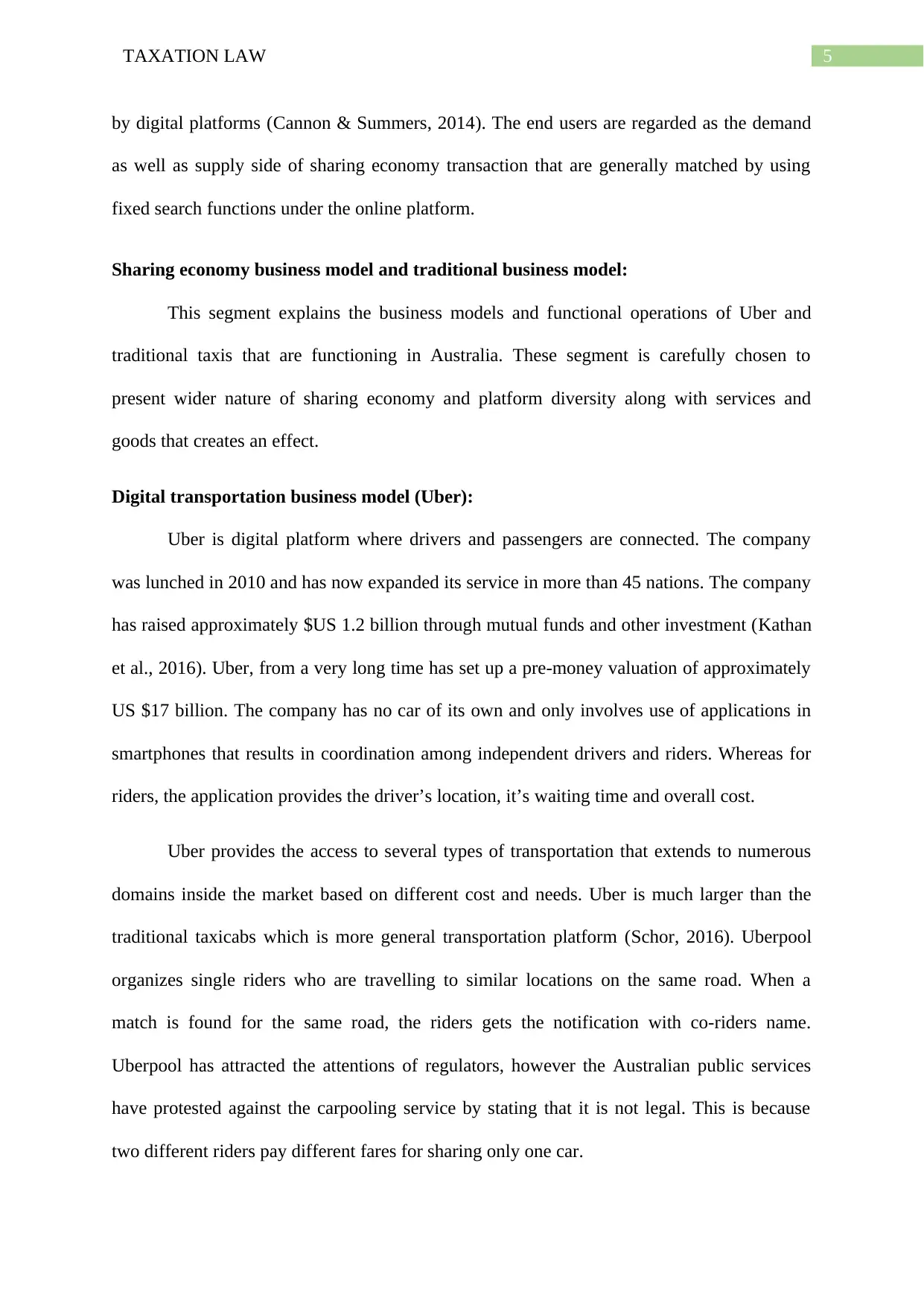
5TAXATION LAW
by digital platforms (Cannon & Summers, 2014). The end users are regarded as the demand
as well as supply side of sharing economy transaction that are generally matched by using
fixed search functions under the online platform.
Sharing economy business model and traditional business model:
This segment explains the business models and functional operations of Uber and
traditional taxis that are functioning in Australia. These segment is carefully chosen to
present wider nature of sharing economy and platform diversity along with services and
goods that creates an effect.
Digital transportation business model (Uber):
Uber is digital platform where drivers and passengers are connected. The company
was lunched in 2010 and has now expanded its service in more than 45 nations. The company
has raised approximately $US 1.2 billion through mutual funds and other investment (Kathan
et al., 2016). Uber, from a very long time has set up a pre-money valuation of approximately
US $17 billion. The company has no car of its own and only involves use of applications in
smartphones that results in coordination among independent drivers and riders. Whereas for
riders, the application provides the driver’s location, it’s waiting time and overall cost.
Uber provides the access to several types of transportation that extends to numerous
domains inside the market based on different cost and needs. Uber is much larger than the
traditional taxicabs which is more general transportation platform (Schor, 2016). Uberpool
organizes single riders who are travelling to similar locations on the same road. When a
match is found for the same road, the riders gets the notification with co-riders name.
Uberpool has attracted the attentions of regulators, however the Australian public services
have protested against the carpooling service by stating that it is not legal. This is because
two different riders pay different fares for sharing only one car.
by digital platforms (Cannon & Summers, 2014). The end users are regarded as the demand
as well as supply side of sharing economy transaction that are generally matched by using
fixed search functions under the online platform.
Sharing economy business model and traditional business model:
This segment explains the business models and functional operations of Uber and
traditional taxis that are functioning in Australia. These segment is carefully chosen to
present wider nature of sharing economy and platform diversity along with services and
goods that creates an effect.
Digital transportation business model (Uber):
Uber is digital platform where drivers and passengers are connected. The company
was lunched in 2010 and has now expanded its service in more than 45 nations. The company
has raised approximately $US 1.2 billion through mutual funds and other investment (Kathan
et al., 2016). Uber, from a very long time has set up a pre-money valuation of approximately
US $17 billion. The company has no car of its own and only involves use of applications in
smartphones that results in coordination among independent drivers and riders. Whereas for
riders, the application provides the driver’s location, it’s waiting time and overall cost.
Uber provides the access to several types of transportation that extends to numerous
domains inside the market based on different cost and needs. Uber is much larger than the
traditional taxicabs which is more general transportation platform (Schor, 2016). Uberpool
organizes single riders who are travelling to similar locations on the same road. When a
match is found for the same road, the riders gets the notification with co-riders name.
Uberpool has attracted the attentions of regulators, however the Australian public services
have protested against the carpooling service by stating that it is not legal. This is because
two different riders pay different fares for sharing only one car.
⊘ This is a preview!⊘
Do you want full access?
Subscribe today to unlock all pages.

Trusted by 1+ million students worldwide
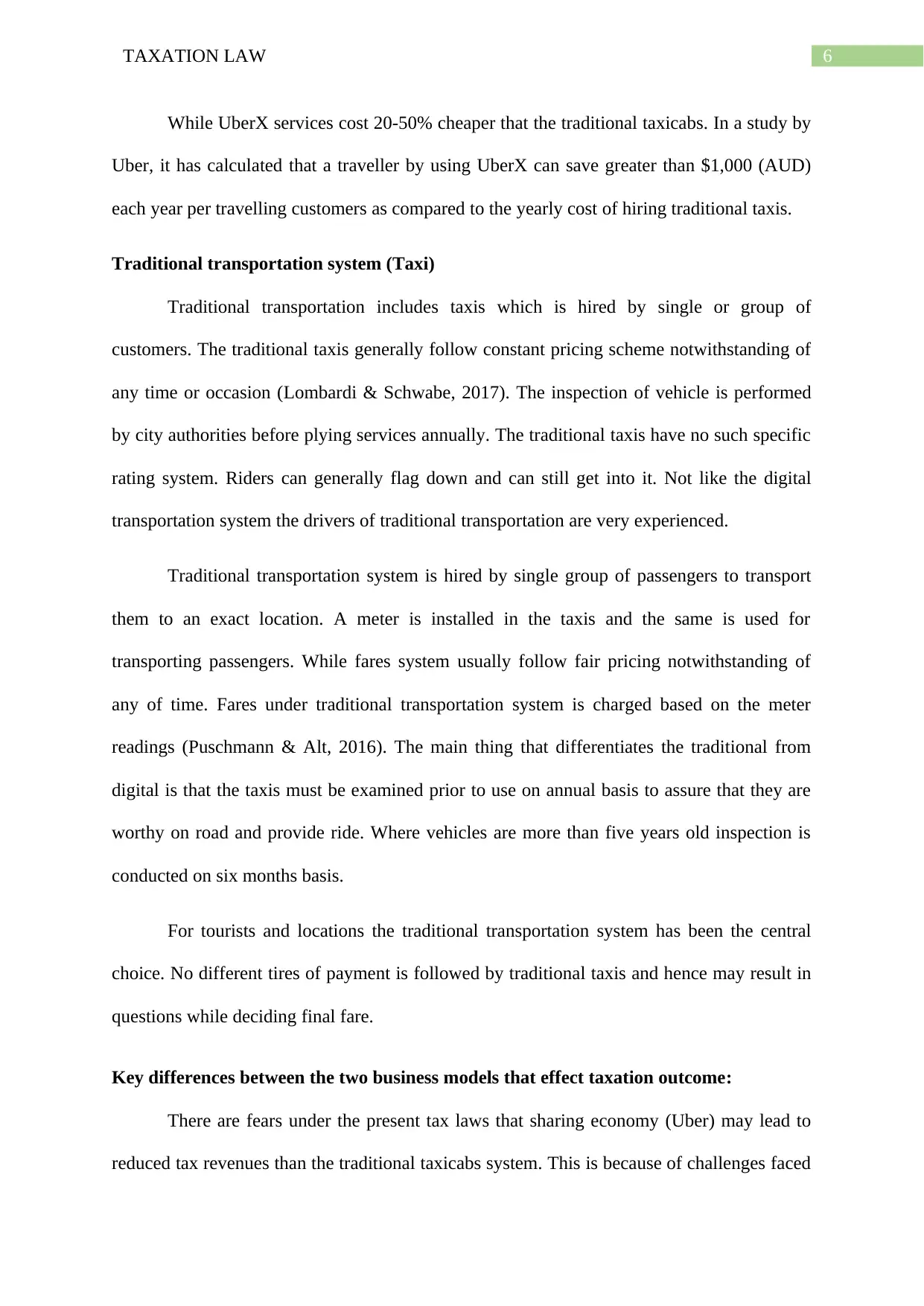
6TAXATION LAW
While UberX services cost 20-50% cheaper that the traditional taxicabs. In a study by
Uber, it has calculated that a traveller by using UberX can save greater than $1,000 (AUD)
each year per travelling customers as compared to the yearly cost of hiring traditional taxis.
Traditional transportation system (Taxi)
Traditional transportation includes taxis which is hired by single or group of
customers. The traditional taxis generally follow constant pricing scheme notwithstanding of
any time or occasion (Lombardi & Schwabe, 2017). The inspection of vehicle is performed
by city authorities before plying services annually. The traditional taxis have no such specific
rating system. Riders can generally flag down and can still get into it. Not like the digital
transportation system the drivers of traditional transportation are very experienced.
Traditional transportation system is hired by single group of passengers to transport
them to an exact location. A meter is installed in the taxis and the same is used for
transporting passengers. While fares system usually follow fair pricing notwithstanding of
any of time. Fares under traditional transportation system is charged based on the meter
readings (Puschmann & Alt, 2016). The main thing that differentiates the traditional from
digital is that the taxis must be examined prior to use on annual basis to assure that they are
worthy on road and provide ride. Where vehicles are more than five years old inspection is
conducted on six months basis.
For tourists and locations the traditional transportation system has been the central
choice. No different tires of payment is followed by traditional taxis and hence may result in
questions while deciding final fare.
Key differences between the two business models that effect taxation outcome:
There are fears under the present tax laws that sharing economy (Uber) may lead to
reduced tax revenues than the traditional taxicabs system. This is because of challenges faced
While UberX services cost 20-50% cheaper that the traditional taxicabs. In a study by
Uber, it has calculated that a traveller by using UberX can save greater than $1,000 (AUD)
each year per travelling customers as compared to the yearly cost of hiring traditional taxis.
Traditional transportation system (Taxi)
Traditional transportation includes taxis which is hired by single or group of
customers. The traditional taxis generally follow constant pricing scheme notwithstanding of
any time or occasion (Lombardi & Schwabe, 2017). The inspection of vehicle is performed
by city authorities before plying services annually. The traditional taxis have no such specific
rating system. Riders can generally flag down and can still get into it. Not like the digital
transportation system the drivers of traditional transportation are very experienced.
Traditional transportation system is hired by single group of passengers to transport
them to an exact location. A meter is installed in the taxis and the same is used for
transporting passengers. While fares system usually follow fair pricing notwithstanding of
any of time. Fares under traditional transportation system is charged based on the meter
readings (Puschmann & Alt, 2016). The main thing that differentiates the traditional from
digital is that the taxis must be examined prior to use on annual basis to assure that they are
worthy on road and provide ride. Where vehicles are more than five years old inspection is
conducted on six months basis.
For tourists and locations the traditional transportation system has been the central
choice. No different tires of payment is followed by traditional taxis and hence may result in
questions while deciding final fare.
Key differences between the two business models that effect taxation outcome:
There are fears under the present tax laws that sharing economy (Uber) may lead to
reduced tax revenues than the traditional taxicabs system. This is because of challenges faced
Paraphrase This Document
Need a fresh take? Get an instant paraphrase of this document with our AI Paraphraser
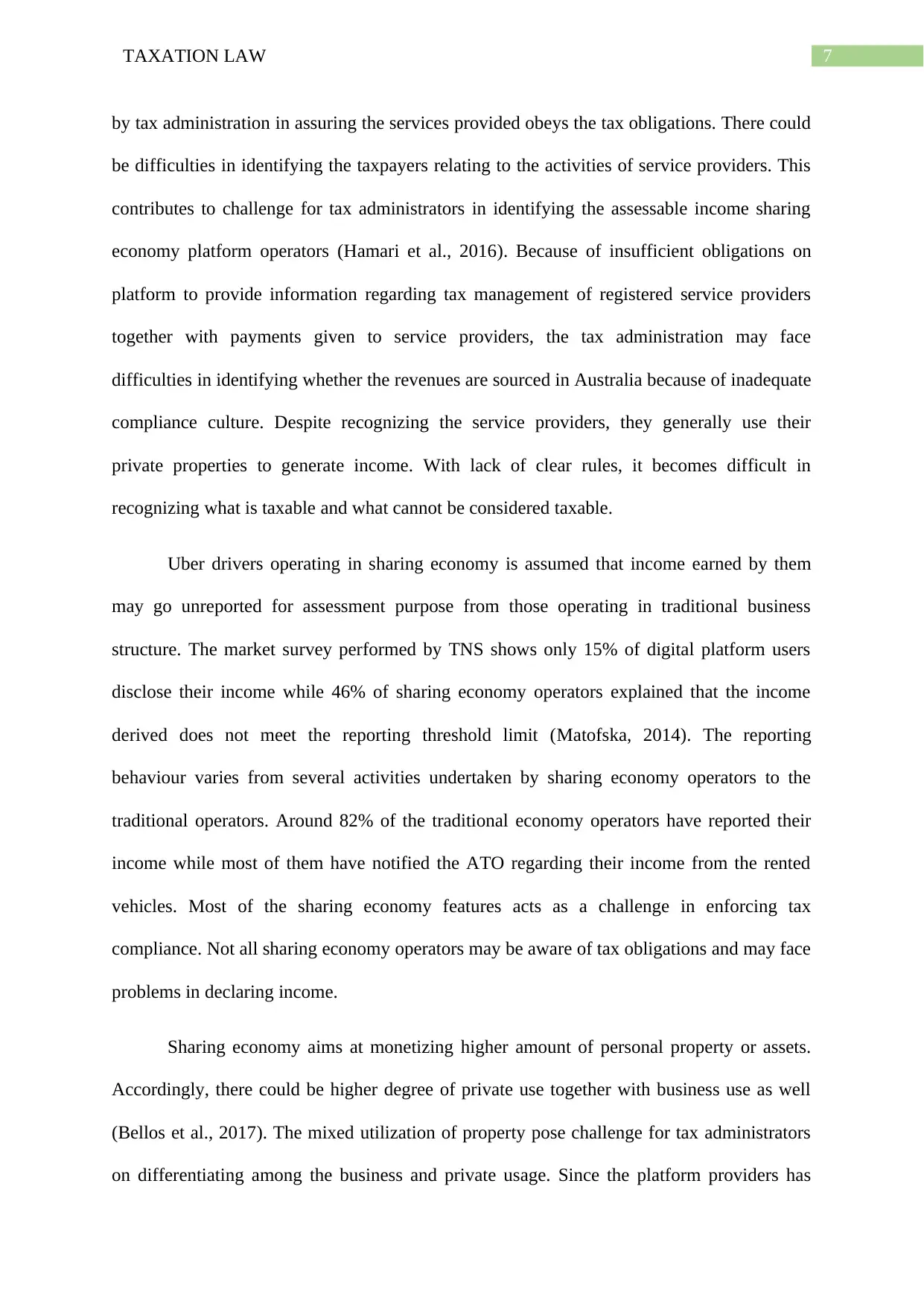
7TAXATION LAW
by tax administration in assuring the services provided obeys the tax obligations. There could
be difficulties in identifying the taxpayers relating to the activities of service providers. This
contributes to challenge for tax administrators in identifying the assessable income sharing
economy platform operators (Hamari et al., 2016). Because of insufficient obligations on
platform to provide information regarding tax management of registered service providers
together with payments given to service providers, the tax administration may face
difficulties in identifying whether the revenues are sourced in Australia because of inadequate
compliance culture. Despite recognizing the service providers, they generally use their
private properties to generate income. With lack of clear rules, it becomes difficult in
recognizing what is taxable and what cannot be considered taxable.
Uber drivers operating in sharing economy is assumed that income earned by them
may go unreported for assessment purpose from those operating in traditional business
structure. The market survey performed by TNS shows only 15% of digital platform users
disclose their income while 46% of sharing economy operators explained that the income
derived does not meet the reporting threshold limit (Matofska, 2014). The reporting
behaviour varies from several activities undertaken by sharing economy operators to the
traditional operators. Around 82% of the traditional economy operators have reported their
income while most of them have notified the ATO regarding their income from the rented
vehicles. Most of the sharing economy features acts as a challenge in enforcing tax
compliance. Not all sharing economy operators may be aware of tax obligations and may face
problems in declaring income.
Sharing economy aims at monetizing higher amount of personal property or assets.
Accordingly, there could be higher degree of private use together with business use as well
(Bellos et al., 2017). The mixed utilization of property pose challenge for tax administrators
on differentiating among the business and private usage. Since the platform providers has
by tax administration in assuring the services provided obeys the tax obligations. There could
be difficulties in identifying the taxpayers relating to the activities of service providers. This
contributes to challenge for tax administrators in identifying the assessable income sharing
economy platform operators (Hamari et al., 2016). Because of insufficient obligations on
platform to provide information regarding tax management of registered service providers
together with payments given to service providers, the tax administration may face
difficulties in identifying whether the revenues are sourced in Australia because of inadequate
compliance culture. Despite recognizing the service providers, they generally use their
private properties to generate income. With lack of clear rules, it becomes difficult in
recognizing what is taxable and what cannot be considered taxable.
Uber drivers operating in sharing economy is assumed that income earned by them
may go unreported for assessment purpose from those operating in traditional business
structure. The market survey performed by TNS shows only 15% of digital platform users
disclose their income while 46% of sharing economy operators explained that the income
derived does not meet the reporting threshold limit (Matofska, 2014). The reporting
behaviour varies from several activities undertaken by sharing economy operators to the
traditional operators. Around 82% of the traditional economy operators have reported their
income while most of them have notified the ATO regarding their income from the rented
vehicles. Most of the sharing economy features acts as a challenge in enforcing tax
compliance. Not all sharing economy operators may be aware of tax obligations and may face
problems in declaring income.
Sharing economy aims at monetizing higher amount of personal property or assets.
Accordingly, there could be higher degree of private use together with business use as well
(Bellos et al., 2017). The mixed utilization of property pose challenge for tax administrators
on differentiating among the business and private usage. Since the platform providers has
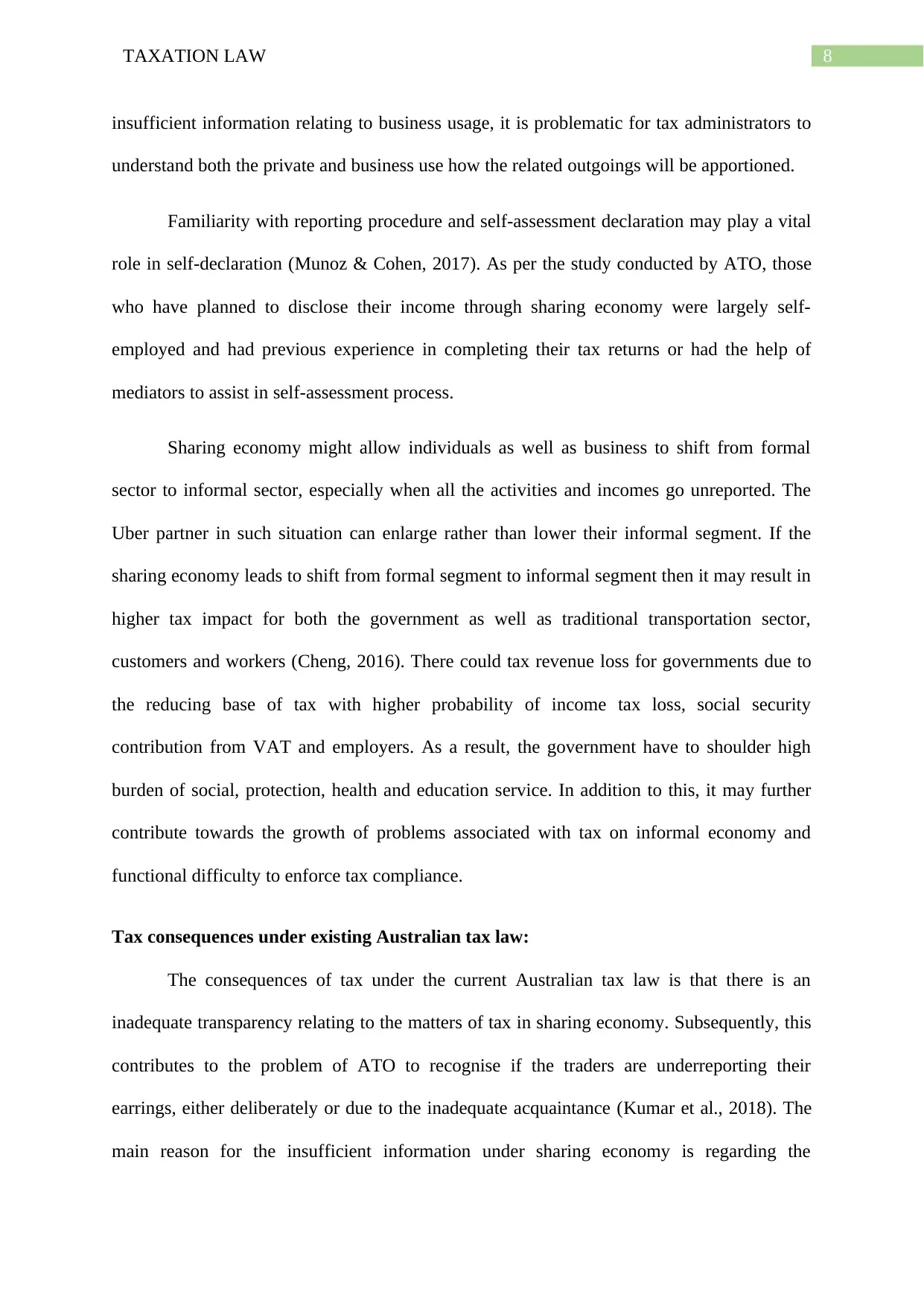
8TAXATION LAW
insufficient information relating to business usage, it is problematic for tax administrators to
understand both the private and business use how the related outgoings will be apportioned.
Familiarity with reporting procedure and self-assessment declaration may play a vital
role in self-declaration (Munoz & Cohen, 2017). As per the study conducted by ATO, those
who have planned to disclose their income through sharing economy were largely self-
employed and had previous experience in completing their tax returns or had the help of
mediators to assist in self-assessment process.
Sharing economy might allow individuals as well as business to shift from formal
sector to informal sector, especially when all the activities and incomes go unreported. The
Uber partner in such situation can enlarge rather than lower their informal segment. If the
sharing economy leads to shift from formal segment to informal segment then it may result in
higher tax impact for both the government as well as traditional transportation sector,
customers and workers (Cheng, 2016). There could tax revenue loss for governments due to
the reducing base of tax with higher probability of income tax loss, social security
contribution from VAT and employers. As a result, the government have to shoulder high
burden of social, protection, health and education service. In addition to this, it may further
contribute towards the growth of problems associated with tax on informal economy and
functional difficulty to enforce tax compliance.
Tax consequences under existing Australian tax law:
The consequences of tax under the current Australian tax law is that there is an
inadequate transparency relating to the matters of tax in sharing economy. Subsequently, this
contributes to the problem of ATO to recognise if the traders are underreporting their
earrings, either deliberately or due to the inadequate acquaintance (Kumar et al., 2018). The
main reason for the insufficient information under sharing economy is regarding the
insufficient information relating to business usage, it is problematic for tax administrators to
understand both the private and business use how the related outgoings will be apportioned.
Familiarity with reporting procedure and self-assessment declaration may play a vital
role in self-declaration (Munoz & Cohen, 2017). As per the study conducted by ATO, those
who have planned to disclose their income through sharing economy were largely self-
employed and had previous experience in completing their tax returns or had the help of
mediators to assist in self-assessment process.
Sharing economy might allow individuals as well as business to shift from formal
sector to informal sector, especially when all the activities and incomes go unreported. The
Uber partner in such situation can enlarge rather than lower their informal segment. If the
sharing economy leads to shift from formal segment to informal segment then it may result in
higher tax impact for both the government as well as traditional transportation sector,
customers and workers (Cheng, 2016). There could tax revenue loss for governments due to
the reducing base of tax with higher probability of income tax loss, social security
contribution from VAT and employers. As a result, the government have to shoulder high
burden of social, protection, health and education service. In addition to this, it may further
contribute towards the growth of problems associated with tax on informal economy and
functional difficulty to enforce tax compliance.
Tax consequences under existing Australian tax law:
The consequences of tax under the current Australian tax law is that there is an
inadequate transparency relating to the matters of tax in sharing economy. Subsequently, this
contributes to the problem of ATO to recognise if the traders are underreporting their
earrings, either deliberately or due to the inadequate acquaintance (Kumar et al., 2018). The
main reason for the insufficient information under sharing economy is regarding the
⊘ This is a preview!⊘
Do you want full access?
Subscribe today to unlock all pages.

Trusted by 1+ million students worldwide
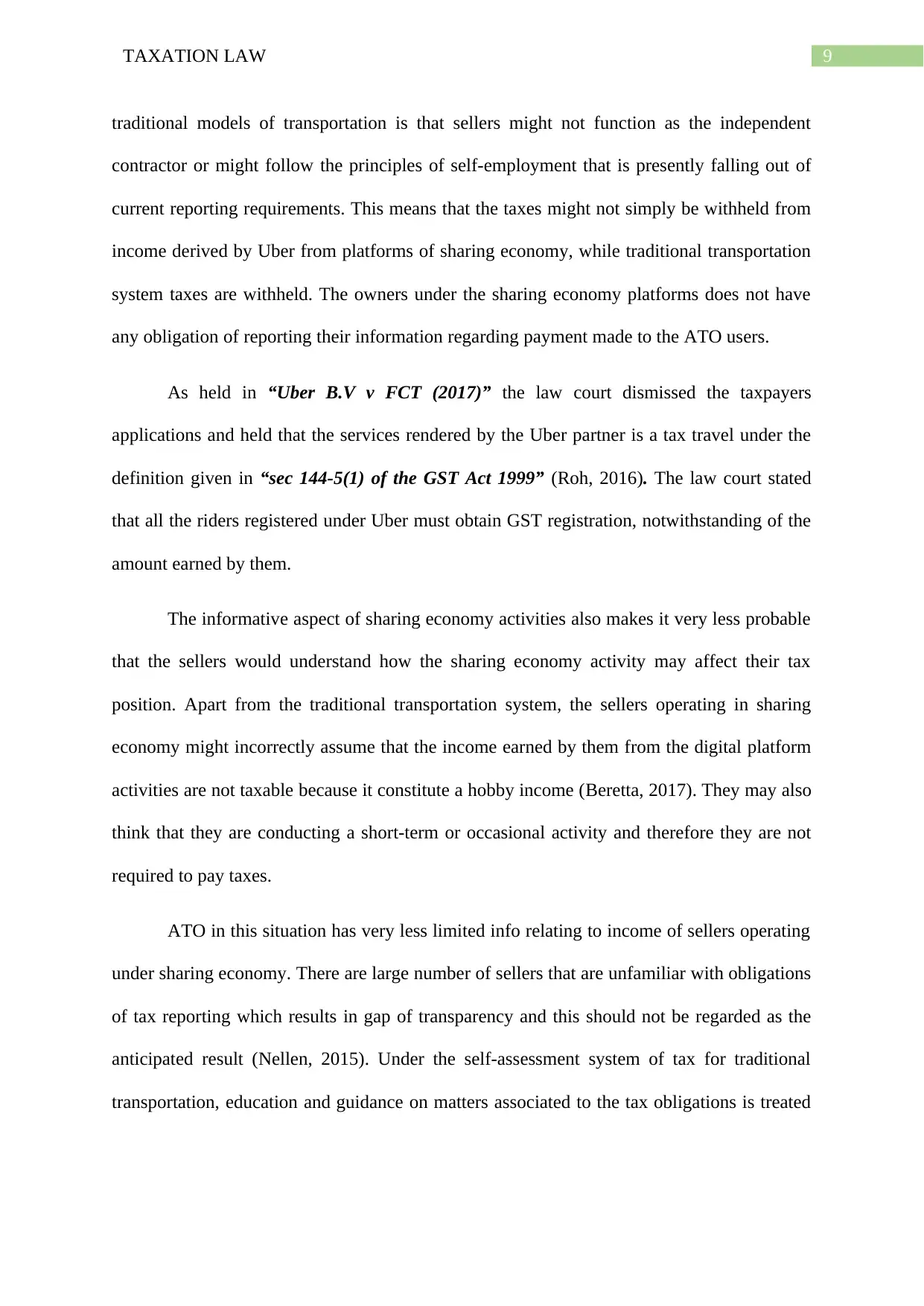
9TAXATION LAW
traditional models of transportation is that sellers might not function as the independent
contractor or might follow the principles of self-employment that is presently falling out of
current reporting requirements. This means that the taxes might not simply be withheld from
income derived by Uber from platforms of sharing economy, while traditional transportation
system taxes are withheld. The owners under the sharing economy platforms does not have
any obligation of reporting their information regarding payment made to the ATO users.
As held in “Uber B.V v FCT (2017)” the law court dismissed the taxpayers
applications and held that the services rendered by the Uber partner is a tax travel under the
definition given in “sec 144-5(1) of the GST Act 1999” (Roh, 2016). The law court stated
that all the riders registered under Uber must obtain GST registration, notwithstanding of the
amount earned by them.
The informative aspect of sharing economy activities also makes it very less probable
that the sellers would understand how the sharing economy activity may affect their tax
position. Apart from the traditional transportation system, the sellers operating in sharing
economy might incorrectly assume that the income earned by them from the digital platform
activities are not taxable because it constitute a hobby income (Beretta, 2017). They may also
think that they are conducting a short-term or occasional activity and therefore they are not
required to pay taxes.
ATO in this situation has very less limited info relating to income of sellers operating
under sharing economy. There are large number of sellers that are unfamiliar with obligations
of tax reporting which results in gap of transparency and this should not be regarded as the
anticipated result (Nellen, 2015). Under the self-assessment system of tax for traditional
transportation, education and guidance on matters associated to the tax obligations is treated
traditional models of transportation is that sellers might not function as the independent
contractor or might follow the principles of self-employment that is presently falling out of
current reporting requirements. This means that the taxes might not simply be withheld from
income derived by Uber from platforms of sharing economy, while traditional transportation
system taxes are withheld. The owners under the sharing economy platforms does not have
any obligation of reporting their information regarding payment made to the ATO users.
As held in “Uber B.V v FCT (2017)” the law court dismissed the taxpayers
applications and held that the services rendered by the Uber partner is a tax travel under the
definition given in “sec 144-5(1) of the GST Act 1999” (Roh, 2016). The law court stated
that all the riders registered under Uber must obtain GST registration, notwithstanding of the
amount earned by them.
The informative aspect of sharing economy activities also makes it very less probable
that the sellers would understand how the sharing economy activity may affect their tax
position. Apart from the traditional transportation system, the sellers operating in sharing
economy might incorrectly assume that the income earned by them from the digital platform
activities are not taxable because it constitute a hobby income (Beretta, 2017). They may also
think that they are conducting a short-term or occasional activity and therefore they are not
required to pay taxes.
ATO in this situation has very less limited info relating to income of sellers operating
under sharing economy. There are large number of sellers that are unfamiliar with obligations
of tax reporting which results in gap of transparency and this should not be regarded as the
anticipated result (Nellen, 2015). Under the self-assessment system of tax for traditional
transportation, education and guidance on matters associated to the tax obligations is treated
Paraphrase This Document
Need a fresh take? Get an instant paraphrase of this document with our AI Paraphraser
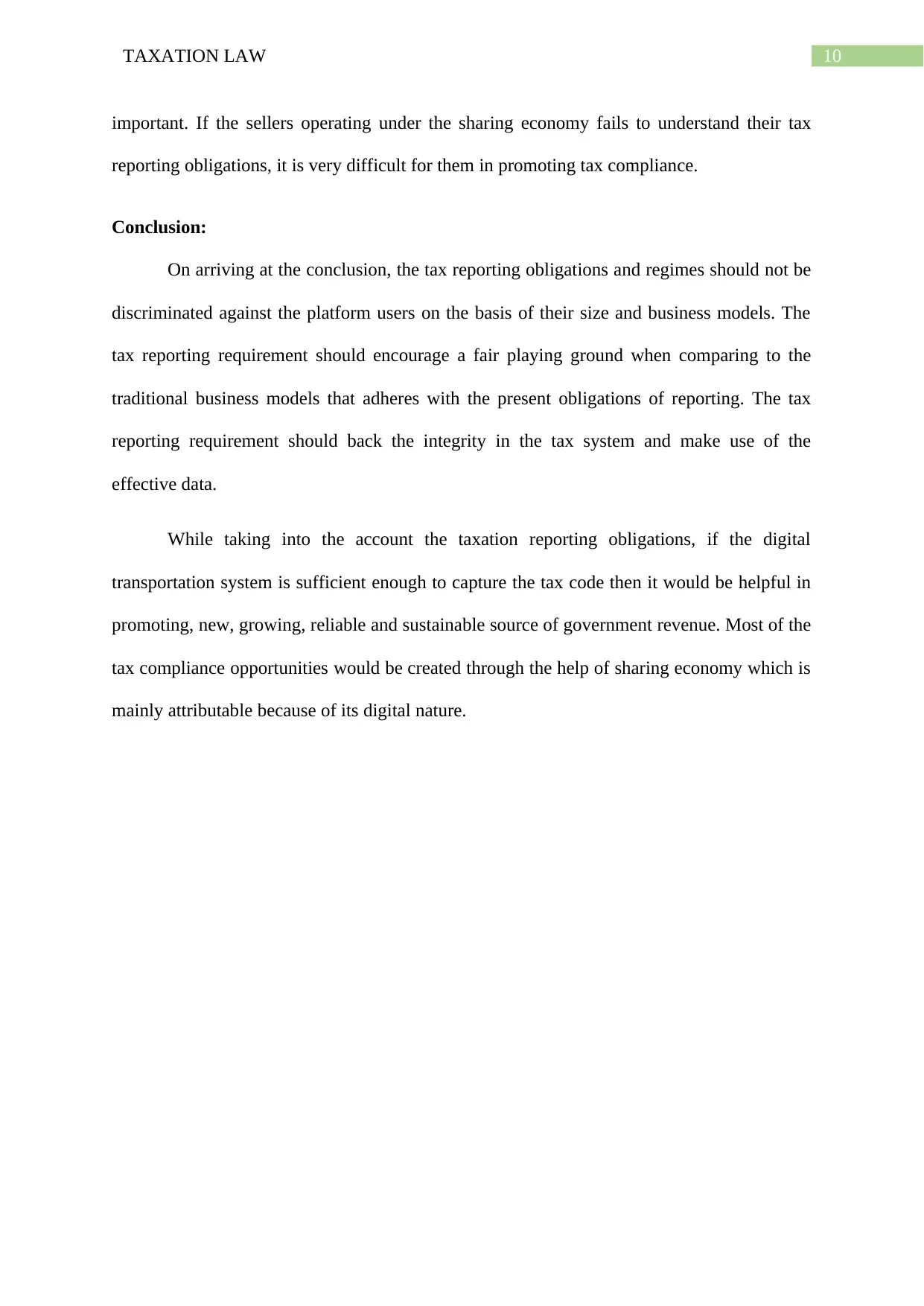
10TAXATION LAW
important. If the sellers operating under the sharing economy fails to understand their tax
reporting obligations, it is very difficult for them in promoting tax compliance.
Conclusion:
On arriving at the conclusion, the tax reporting obligations and regimes should not be
discriminated against the platform users on the basis of their size and business models. The
tax reporting requirement should encourage a fair playing ground when comparing to the
traditional business models that adheres with the present obligations of reporting. The tax
reporting requirement should back the integrity in the tax system and make use of the
effective data.
While taking into the account the taxation reporting obligations, if the digital
transportation system is sufficient enough to capture the tax code then it would be helpful in
promoting, new, growing, reliable and sustainable source of government revenue. Most of the
tax compliance opportunities would be created through the help of sharing economy which is
mainly attributable because of its digital nature.
important. If the sellers operating under the sharing economy fails to understand their tax
reporting obligations, it is very difficult for them in promoting tax compliance.
Conclusion:
On arriving at the conclusion, the tax reporting obligations and regimes should not be
discriminated against the platform users on the basis of their size and business models. The
tax reporting requirement should encourage a fair playing ground when comparing to the
traditional business models that adheres with the present obligations of reporting. The tax
reporting requirement should back the integrity in the tax system and make use of the
effective data.
While taking into the account the taxation reporting obligations, if the digital
transportation system is sufficient enough to capture the tax code then it would be helpful in
promoting, new, growing, reliable and sustainable source of government revenue. Most of the
tax compliance opportunities would be created through the help of sharing economy which is
mainly attributable because of its digital nature.
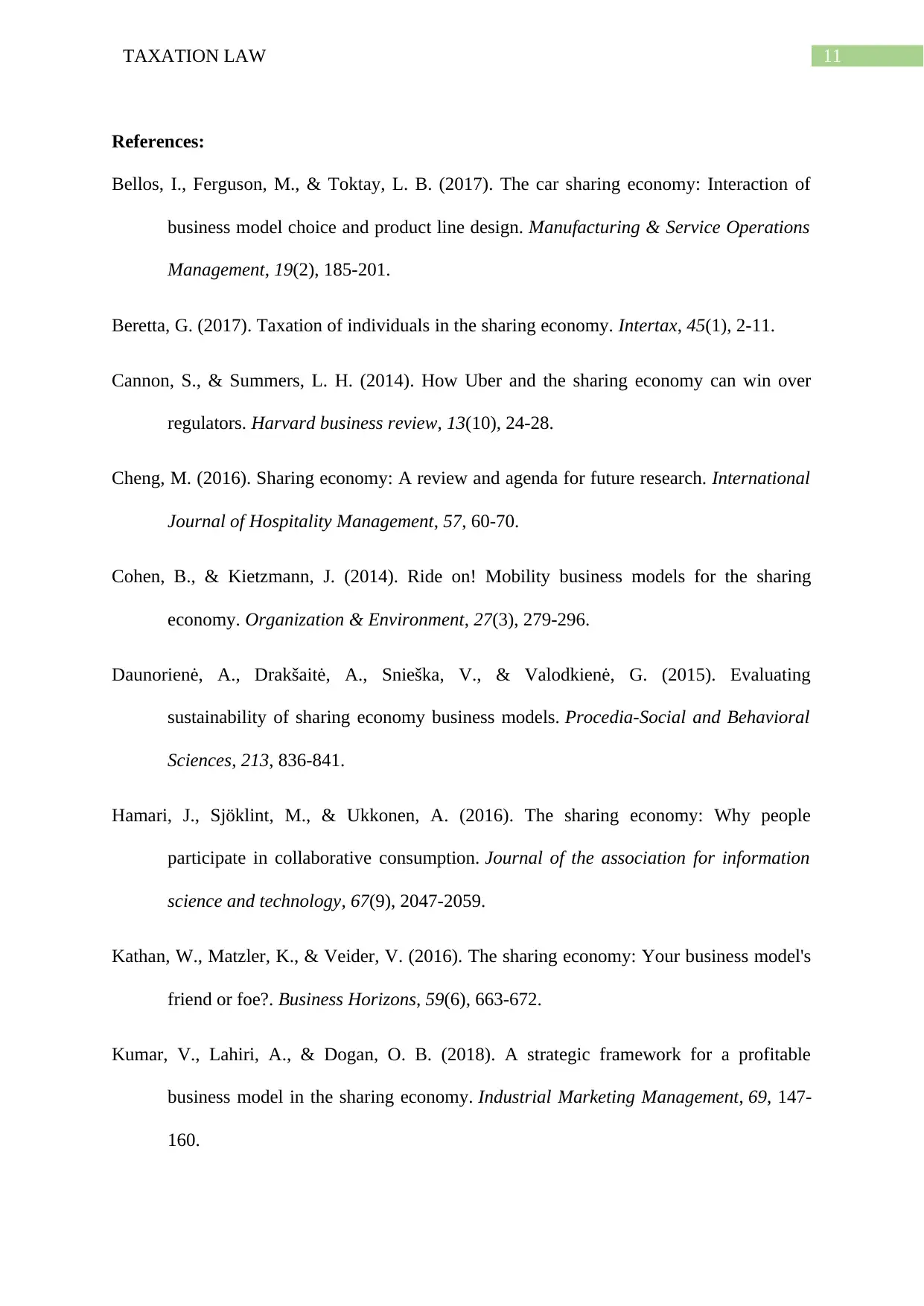
11TAXATION LAW
References:
Bellos, I., Ferguson, M., & Toktay, L. B. (2017). The car sharing economy: Interaction of
business model choice and product line design. Manufacturing & Service Operations
Management, 19(2), 185-201.
Beretta, G. (2017). Taxation of individuals in the sharing economy. Intertax, 45(1), 2-11.
Cannon, S., & Summers, L. H. (2014). How Uber and the sharing economy can win over
regulators. Harvard business review, 13(10), 24-28.
Cheng, M. (2016). Sharing economy: A review and agenda for future research. International
Journal of Hospitality Management, 57, 60-70.
Cohen, B., & Kietzmann, J. (2014). Ride on! Mobility business models for the sharing
economy. Organization & Environment, 27(3), 279-296.
Daunorienė, A., Drakšaitė, A., Snieška, V., & Valodkienė, G. (2015). Evaluating
sustainability of sharing economy business models. Procedia-Social and Behavioral
Sciences, 213, 836-841.
Hamari, J., Sjöklint, M., & Ukkonen, A. (2016). The sharing economy: Why people
participate in collaborative consumption. Journal of the association for information
science and technology, 67(9), 2047-2059.
Kathan, W., Matzler, K., & Veider, V. (2016). The sharing economy: Your business model's
friend or foe?. Business Horizons, 59(6), 663-672.
Kumar, V., Lahiri, A., & Dogan, O. B. (2018). A strategic framework for a profitable
business model in the sharing economy. Industrial Marketing Management, 69, 147-
160.
References:
Bellos, I., Ferguson, M., & Toktay, L. B. (2017). The car sharing economy: Interaction of
business model choice and product line design. Manufacturing & Service Operations
Management, 19(2), 185-201.
Beretta, G. (2017). Taxation of individuals in the sharing economy. Intertax, 45(1), 2-11.
Cannon, S., & Summers, L. H. (2014). How Uber and the sharing economy can win over
regulators. Harvard business review, 13(10), 24-28.
Cheng, M. (2016). Sharing economy: A review and agenda for future research. International
Journal of Hospitality Management, 57, 60-70.
Cohen, B., & Kietzmann, J. (2014). Ride on! Mobility business models for the sharing
economy. Organization & Environment, 27(3), 279-296.
Daunorienė, A., Drakšaitė, A., Snieška, V., & Valodkienė, G. (2015). Evaluating
sustainability of sharing economy business models. Procedia-Social and Behavioral
Sciences, 213, 836-841.
Hamari, J., Sjöklint, M., & Ukkonen, A. (2016). The sharing economy: Why people
participate in collaborative consumption. Journal of the association for information
science and technology, 67(9), 2047-2059.
Kathan, W., Matzler, K., & Veider, V. (2016). The sharing economy: Your business model's
friend or foe?. Business Horizons, 59(6), 663-672.
Kumar, V., Lahiri, A., & Dogan, O. B. (2018). A strategic framework for a profitable
business model in the sharing economy. Industrial Marketing Management, 69, 147-
160.
⊘ This is a preview!⊘
Do you want full access?
Subscribe today to unlock all pages.

Trusted by 1+ million students worldwide
1 out of 13
Related Documents
Your All-in-One AI-Powered Toolkit for Academic Success.
+13062052269
info@desklib.com
Available 24*7 on WhatsApp / Email
![[object Object]](/_next/static/media/star-bottom.7253800d.svg)
Unlock your academic potential
Copyright © 2020–2025 A2Z Services. All Rights Reserved. Developed and managed by ZUCOL.





